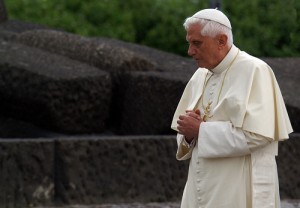
Pope Benedict XVI acknowledging his time has come? Photo by Catholic Church (England and Wales) via Flickr.
On February 11th, amid universal surprise, Pope Benedict XVI stunned the world as he announced his intention to abdicate as head of the Catholic Church at the end of the month. In a message read out in Latin before the cardinals gathered in the Vatican City’s Apostolic palace, Pope Benedict said he was ready to give up his functions, breaking a 600-year-long taboo and raising new questions over the role of the Holy See in the third millennium.
Speaking before the cardinals, Pope Benedict blamed his advanced age and said the decision had been taken “in full liberty” and “for the good of the Church”. Rumours of a prolonged illness were soon dismissed, as were the Italian media’s conspiracy theories claiming the pontiff’s decision, taken only a few weeks before the country’s general elections, could not be a mere coincidence. No, the Pope is not fatally ill. Nor is he part of Berlusconi’s masterplan to return at Italy’s helm. What remains unclear is the rationale behind such a historical decision. And, more crucially still, the extent to which the Pope’s resignation is likely to reconfigure the role of an institution that seems to have lost touch with its spiritual dimension and entered new, conflictual domains.
A history of scandals
If the pontiff’s rule will most likely be remembered for its unexpected ending, Pope Benedict’s watch was nonetheless marked by a number of equally memorable and troublesome events. Last year, former papal butler Paolo Gabriele was found guilty of leaking top secret files which revealed a Holy See riddled with nepotism, rivalries and corruption. Vatileaks successfully stripped the Church of its otherworldly rhetoric and exposed its internal ills, including prelates attempting to undermine the role of cardinal Bertone, the Vatican Secretary of State, allegedly among the greatest opponents to renovation within the Church; a dramatic mismanagement of the Vatican Bank; and the attempt of Italian cardinals to gain a greater saying on the Pope’s successor.
No longer recognised as a spiritual community made up of 1.2 billion disciples, but a secular institution failing to grapple with its religious and mundane dimensions, the Church emerged from the scandal significantly weakened – as did its leader. The secret files depicted Pope Benedict as an aloof intellectual with little or no ability to exercise power and quell destabilising rivalries.
A problematic dialogue with the present
Finding the right space for a dialogue with modernity in a world which, in the Pope’s own words, is “shaken by questions of great importance” becomes cardinal for the future of Catholicism. Addressing the Roman clergy in one of his last appearances, Pope Benedict admitted the relationship between Christianity and the present poses difficult questions.
Unfortunately, admitting the great importance of such questions doesn’t amount to coming to terms with them. From the dilemma of euthanasia to that of abortion, from the use of contraception to the question of gay marriage, the response of the Catholic Church has all too often come down to blind opposition. But in a world the Pope described as “undergoing constant changes”, wherein the religious domain must constantly fight for its legitimacy and space in everyday life, turning the back on questions of growing importance is bound to leave the Church out of touch with the present.
Sealing a contagious wound
In this sense, addressing Pope Benedict’s decision becomes key for a number of different, albeit interlocked, reasons. A pope who chooses to give up his function throws the Catholic Church in the domain of the secular. The boundaries between the Holy See and its devotees around the world, once blurred, now gain a firmer shape. No longer synonymous with the body of its followers, the Church turns into an institution inescapably alienated from them. In the face of the recent scandals, magnified by the Pope’s resignation, the idea that the Vatican is representative of a transnational religious community is no longer a given.
In the eyes of the Holy See, Pope Benedict’s decision threatens a domino effect. The fear is that his resignation could expose the Vatican to a crisis of legitimacy that may affect Catholic institutions at large. The words the Pope used to seal his departure (“Divisions within the ecclesiastic world deform the Church – we must overcome all rivalries”) sound ominous. The future credibility of the Catholic Church may well depend on how fast – and how well – this wound will be sealed.
The legacy of a historical decision
There’s a sense in which the term resignation carries the undertones of passivity; an apathetic surrender. There is nothing of the like in Pope Benedict’s decision. If the pontiff’s intention was that of opposing a hierarchical institution poisoned by internal power struggles, his stepping down comes across as the best means to such end. This, of course, is a big if. There is plenty of room to argue that the Pope himself embodied this sense of hierarchy, and did little to overcome the Church’s pathological impasse before the challenges of the present. But giving up the papacy was nonetheless an active decision, one that is set to resonate in the years to come, and raise new problematic questions for the future of Christianity.
The image of a Pope giving up his role as head of a millenarian institution, at a time when this is riddled with internal scandals and external pressures it no longer seems capable to address, is potentially devastating. For it leaves the Church, now more than ever, naked and unprepared before modernity – the very modernity which the Vatican has long opposed, at times tried to confront, but never fundamentally understood.



